Record of State Taxation Administration of The People’s Republic of China’s press conference
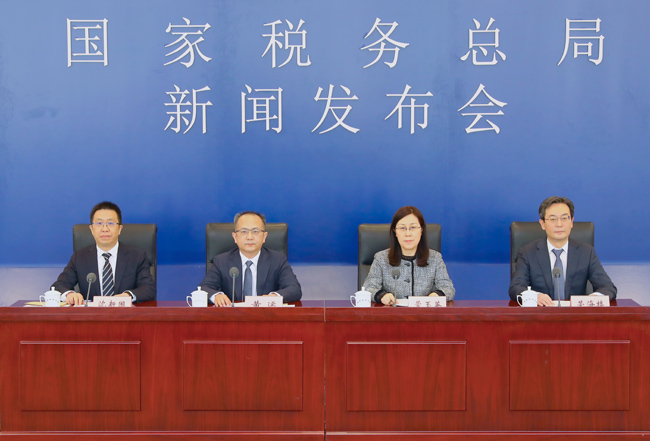
Huang Yun:Good morning, journalists and friends! I’m Huang Yun, director of the General Office of State Taxation Administration of The People’s Republic of China and spokesperson. Welcome to the press conference of the State Administration of Taxation. Present at today’s conference are Ms. Meng Yuying, Director of the International Taxation Department of State Taxation Administration of The People’s Republic of China, Mr. Rong Hai Lou, Director of the Income Planning and Accounting Department, and Mr. Shen Xinguo, Director of the Tax Service Department. They will introduce relevant information and answer your questions.
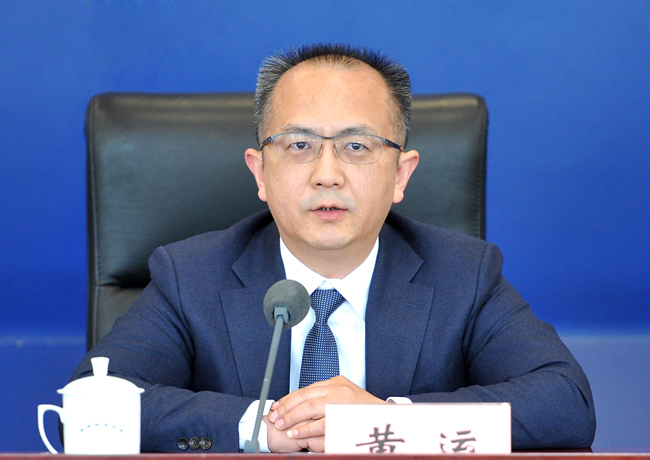
Huang Yun, Director of the General Office of State Taxation Administration of The People’s Republic of China and spokesperson.
The 20th National Congress of the Communist Party of China emphasized the need to adhere to the people-centered development ideology, so that the achievements of modernization can benefit all people more fairly, and put forward clear requirements for further optimizing the business environment. The State Administration of Taxation thoroughly studied and implemented the spirit of the 20th Congress of the Communist Party of China, fully implemented the decision-making arrangements made by the CPC Central Committee and the State Council, and focused on the "urgent difficulties and worries" of taxpayers. This year, with the theme of "doing a good job in benefiting the people and modernizing services", it launched the "Spring Breeze Action for Facilitating Taxes" for the 10th consecutive year, and launched the first batch of 17 measures for facilitating services to further solve practical problems and continuously optimize the tax business environment. These measures have been welcomed by taxpayers and payers, and some of them have been effective. For example, 13 items of tax-related fees were included in the scope of allowance, and 34 items of tax and fee information were further streamlined. Digital RMB payment of taxes and fees met the diversified needs of taxpayers, and tax and fee processing was more efficient and faster. Another example is to further play the role of tax big data, and on the premise of respecting the wishes of enterprises, to bridge the gap between enterprises with poor supply chain in the industrial chain and help the supply and demand sides to connect. In January, 426 enterprises have been helped to realize effective purchase and sale of 980 million yuan independently.
While wholeheartedly implementing the first batch of measures of the "Spring Breeze Action for Convenient Taxation", we further focused on the new demands and expectations of taxpayers and payers, and then launched the second batch of 25 measures for convenient service. These measures cover a wider range and are richer in content, and mainly have the following characteristics:First, focus on the efficient implementation of policies to help enterprises solve difficulties.For example, multi-channel accurate policy push will make the tax and fee policy dividend better direct and fast.The second is to focus on promoting intelligent taxation to help enterprises reduce burdens and increase efficiency.For example, the implementation of social insurance handling and payment business "through one network" and the exploration of the implementation of "one-click zero declaration" of stamp duty of electronic taxation bureau will make taxation more intelligent and convenient.The third is to focus on optimizing law enforcement methods to help enterprises compete fairly.For example, for some tax-related matters of a specific nature, we will implement law enforcement methods such as persuasion and education, prompting and reminding, actively carry out credit repair, and guide business entities to participate in fair competition and develop healthily and orderly.
In recent years, China tax authorities have also actively served the high-level opening-up and high-quality joint construction of the Belt and Road, blowing the "convenience spring breeze" to the Belt and Road.
In April 2019, in order to implement the spirit of the important instructions of the Chairman of the Supreme Leader on jointly building the Belt and Road and deepening international tax cooperation, at the initiative of China and State Taxation Administration of The People’s Republic of China, the "Belt and Road" tax collection and management cooperation mechanism was formally established, dedicated to improving the coordination and reciprocity in the tax field of the "Belt and Road" countries and building a growth-friendly tax environment. The "One Belt, One Road" tax collection and management capacity promotion alliance is an institution specifically responsible for capacity building such as training, research and technical assistance under the cooperation mechanism. Today, the Alliance will publicly release version 1.0 of the Alliance curriculum system to the world through the cooperation mechanism of official website and the website of the Belt and Road Taxation Institute. In the construction of this curriculum system, China has actively participated in and contributed an important force through the Alliance Office. Its popularization and application will give full play to the multilateral role of the cooperation mechanism, and help us deepen international tax exchange and cooperation, and work with the tax authorities of the Belt and Road partners to jointly build the Belt and Road with high quality. Mainly reflected in:
First, take tax as the medium, learn from each other and promote the improvement of ability together.By jointly launching the curriculum system and in-depth tax training, the alliance is conducive to deepening cooperation and complementing each other’s advantages, and helping the "Belt and Road" partners to jointly improve their tax collection and management capabilities in strengthening experience sharing and mutual learning.
The second is to help finance with taxes, enhance recognition and promote the integration of rules.China’s tax authorities actively participate in the formulation of international tax rules, and promote the Belt and Road partners to better abide by and improve tax rules through alliance training, so as to enhance tax certainty, which is conducive to promoting the "soft connectivity" of rules and standards of member countries.
The third is to serve the overall situation and promote economic and trade convenience with taxation.Relying on cooperation mechanisms and alliances, China tax authorities will further strengthen personnel training, deepen international tax cooperation and mutual assistance in tax collection and management, which will help to eliminate cross-border trade and investment barriers and better promote the trade liberalization and facilitation of "Belt and Road" partners.
I’ll introduce these first, and then enter the question-and-answer session. Welcome to ask questions.
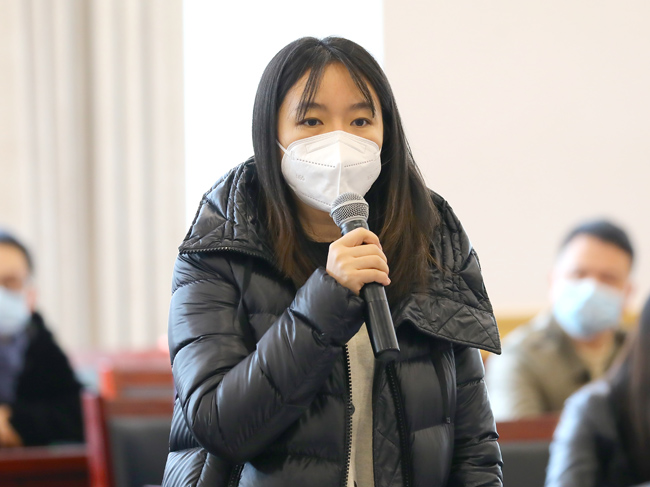
CCTV reporter from the Central Radio and Television General Station asked questions.
1. CCTV reporter from the Central Radio and Television General Station: Just now, Director Huang mentioned that the tax authorities have launched the second batch of 25 successive measures of the "Spring Breeze Action for Facilitating Taxes". Please introduce the specific situation.
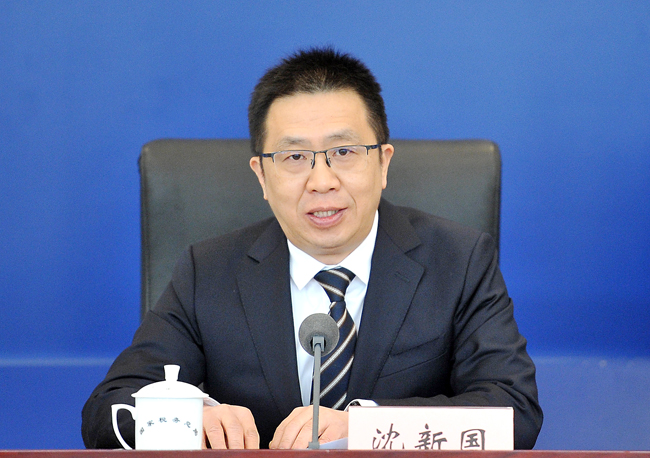
Shen Xinguo, Director of State Taxation Administration of The People’s Republic of China Tax Service Department
Shen Xinguo:Thank you for your question. The State Administration of Taxation launched the second batch of 25 measures, focusing on solving practical problems for taxpayers and payers from six aspects.
In terms of "improving the quality of appeal response",Five measures, such as promoting preferential tax policies and optimizing the functions of natural person tax management system, were introduced to optimize tax payment services and enhance tax payment experience. For example, the tax authorities will make good use of the "Fengqiao experience" in the new era, continue to unblock the channels for taxpayers to express their demands and protect their rights and interests, give full play to the role of mediation, and better safeguard the legitimate rights and interests of taxpayers and payers.
In terms of "policy implementation and efficiency improvement",Five measures, such as optimizing the library of tax and fee policies and regulations, strengthening the publicity and interpretation of tax and fee policies, and improving the awareness and delivery rate of policies, were introduced. For example, the State Administration of Taxation will optimize and improve the official website tax and fee policies and regulations library to further facilitate the public to inquire about the tax and fee policies; The "Volunteer Action of Tax Youth Helping Enterprises and Benefiting the People" will also be launched, and the vast number of tax youths will be organized to provide taxpayers with more detailed and temperature-sensitive services in the form of voluntary service, so as to promote the more accurate and effective implementation of tax and fee policies.
In terms of "fine service upgrading",Five measures were introduced, such as strengthening regional law enforcement coordination, jointly carrying out theme service month activities to help small and medium-sized enterprises develop with the departments of industry and information technology, and deepening the pilot project of "bank-tax interaction" data direct connection with the banking and insurance supervision department to better serve high-quality development. For example, the tax authorities will deepen the interactive service of tax collection and payment, and help taxpayers to solve the policy and operation problems encountered in online tax payment through "ask" and "do" collaborative services such as accurate push, intelligent response and sharing on the same screen, and assist them to complete business processing, making "non-contact" tax payment more convenient and easier to handle.
In terms of "speeding up intelligent taxation",Three measures were introduced to improve the convenience of tax payment, such as optimizing the tax terminal function of natural person tax management information system, continuously implementing social insurance handling and online "one-line communication" for payment business. For example, the tax authorities will further expand the promotion results of electronic tax payment across provinces, provide more convenient tax payment methods for taxpayers operating across provinces, and realize cross-provincial tax payment without leaving home.
In terms of "streamlining processes and upgrading",Five measures, such as simplifying the stamp duty declaration process and promoting the pilot of the occupational injury protection system, were introduced to optimize the taxpayer’s handling experience. For example, the tax authorities will simplify the stamp duty declaration process, explore the combined declaration of taxable contracts with the same tax items in some industries and keep them for future reference, optimize the stamp duty declaration of the electronic tax bureau, explore the realization of "one-click zero declaration", and further optimize the taxpayer’s tax declaration experience.
In terms of "standardizing law enforcement and upgrading",Two measures were introduced to further optimize tax law enforcement and safeguard the legitimate rights and interests of taxpayers and payers. For example, for some tax-related business matters of a specific nature, persuasion and education, tips and reminders are promoted and used; We will strengthen the dynamic management of information on the subject of major tax violations and dishonesty, actively carry out credit repair work for taxpayers who meet the compliance conditions after correcting mistakes, and guide them to operate legally and standardize their development.
In the next step, the tax authorities will pay close attention to the implementation of the above measures, promote the spring breeze of tax collection for the convenience of the people, warm the people’s hearts, and continuously improve the sense of acquisition and satisfaction of taxpayers and payers.
Thank you!
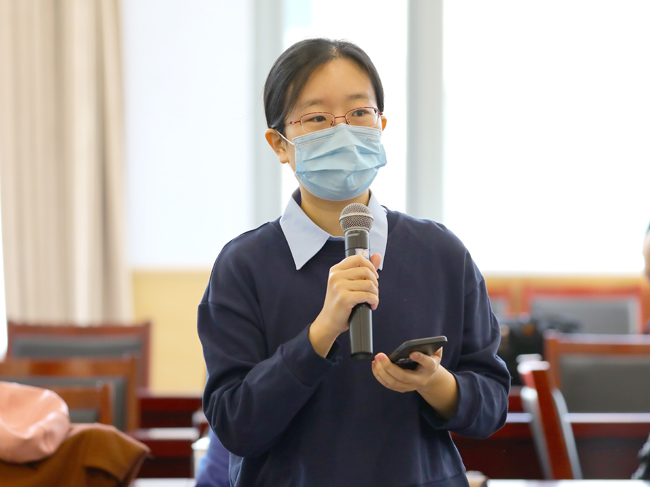
People’s Daily reporter asked questions.
2. People’s Daily reporter: Just now, Director Shen said that one of the important contents of the second batch of measures of "Spring Breeze Action for Convenient Taxation" is to further expand the promotion results of electronic tax payment across provinces in China. Can you tell us more about it?
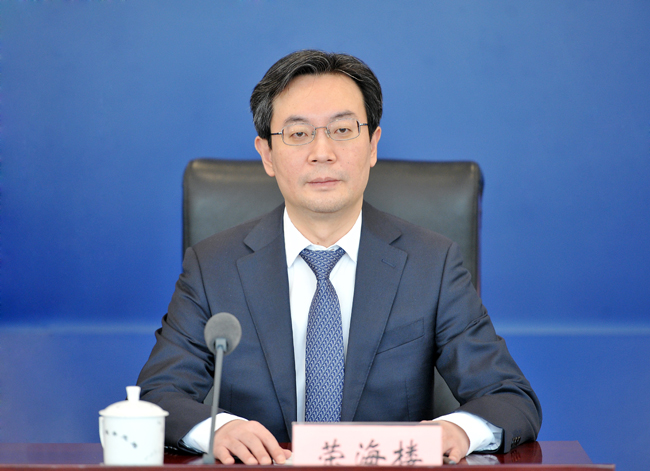
Rong Hai Building, Director of State Taxation Administration of The People’s Republic of China Revenue Planning and Accounting Department
Rong Hai building:Thank you for your question. In recent years, the tax authorities have vigorously promoted electronic tax payment and made great efforts to provide taxpayers with convenient and efficient tax service. At present, 99% of tax returns have been processed online, and more than 95% of taxes have been paid into the warehouse by electronic tax payment. However, there are some problems, such as the low degree of electronicization and inconvenience, in the transfer and payment between the place of registration and the place of business, for the payable taxes arising from the establishment of project departments and branches across provinces and other places to carry out business activities (such as the establishment of project departments across provinces and other places to provide construction and installation services). To this end, since 2021, the tax department and the treasury department of the People’s Bank of China have strengthened collaborative innovation. With the strong support of relevant commercial banks, 12 regions in Beijing, Tianjin and Hebei, Yangtze River Delta and other regions with active inter-provincial business activities have been selected to take the lead in launching cross-provincial electronic tax payment pilots, and in 2022, the promotion efforts have been further strengthened, the application scope has been expanded, and positive results have been achieved. In 2022, more than 150 commercial banks have supported the inter-provincial and off-site electronic tax payment business, and handled a total of 310,000 inter-provincial and off-site electronic tax payments with a tax revenue of 57.5 billion yuan. Taxpayers report that after electronic tax payment across provinces and different places is realized, it can be handled without leaving home, which effectively reduces the burden and improves efficiency.
This year, we will continue to improve and perfect in accordance with the deployment arrangement of the "Spring Breeze Action for Convenient Taxation", and further expand the promotion results of electronic tax payment across provinces and different places in China.On the one hand,Expand the coverage of local commercial banks, cooperate with the treasury department of the People’s Bank of China to further enhance the participation of some local commercial banks that have not yet joined this business in implementing cross-provincial electronic tax payment, guide and promote more qualified local commercial banks to participate in and support cross-provincial electronic tax payment.On the other hand,Expand the coverage of tax payment business. At present, commercial banks mainly support taxpayers who have signed tax deduction agreements with tax authorities and banks to handle cross-provincial electronic tax payment business, and promote commercial banks to further optimize system functions, increase support for taxpayers who have not signed tax deduction agreements to handle cross-provincial electronic tax payment business, and further enhance the convenience of taxpayers operating across provinces. Thank you!

China securities journal reporter asked questions.
3. Reporter from china securities journal: It is also an important measure of the "Spring Breeze Action for Facilitating Taxes" to do a good job in the first batch of tax-related reform measures replicated and promoted in the whole country. Can you tell us more about it?
Shen Xinguo:Thank you for your question. Optimizing the business environment is the key to cultivate and stimulate the vitality of business entities and enhance the endogenous power of development. In 2021, the State Council was deployed in six cities including Beijing, Shanghai, Chongqing, Hangzhou, Guangzhou and Shenzhen to carry out business environment innovation pilot projects. The Party Committee of the State Administration of Taxation fully implemented the decision-making arrangements of the CPC Central Committee and the State Council, thoroughly implemented the pilot work of business environment innovation, guided and urged the tax bureaus of six pilot cities to implement 16 tax-related measures and achieved remarkable results. In September, 2022, the General Office of the State Council issued the Notice on Replicating and Promoting Pilot Reform Measures of Business Environment Innovation, and decided to replicate and promote 50 pilot innovation measures nationwide, including 12 tax-related measures. The main highlights of these measures are:
First, continue to compress the tax payment time.The implementation of "multi-tax integration" comprehensive declaration, the pilot unit to integrate corporate income tax and property and behavior tax comprehensive declaration, relying on the electronic tax bureau to achieve "one declaration, one payment, one voucher"; Beijing, Shanghai and Chongqing also include value-added tax, consumption tax and vehicle purchase tax in the scope of comprehensive declaration, making it easier for taxpayers to declare. The pilot units distribute tax UKey to taxpayers in non-contact ways such as self-collection, mail delivery and so on through channels such as electronic tax bureau. Up to now, each pilot unit has distributed more than 500,000 tax UKey in a "non-contact" way to facilitate taxpayers to issue invoices.
The second is to optimize the law enforcement supervision mechanism.Explore new ways of flexible supervision, establish a list of non-compulsory administrative measures, and implement non-compulsory administrative measures for matters that are obviously minor or have no obvious social harm and can achieve the purpose of administrative management by non-compulsory means. Up to now, the pilot units have identified 28 items that will not be enforced, which embodies the concept of "combining leniency with severity" in tax law enforcement. Accurately implement tax supervision, and explore and promote the construction of a new tax supervision system based on "credit+risk". According to the tax credit status of business entities, the pilot units will implement classified management in matters such as invoice collection and tax cancellation, and in accordance with the principle of "encouraging trustworthiness and punishing dishonesty", so that trustworthy taxpayers can enjoy more convenience, and taxpayers with low credit ratings will be subject to key supervision and strict supervision.
The third is to promote data sharing.Try out the online inquiry and verification of the national travel tax payment information, so as to facilitate the insurance institutions in the pilot cities to inquire about the national travel tax payment, and facilitate the vehicles in different places to apply for insurance and pay taxes. At the same time, the tax bureaus of the pilot cities actively cooperate with the market supervision departments to expand the business scope of "one network to run" and implement the reform of "multi-reporting in one" in the annual report of enterprises, so as to make data "run more roads" and taxpayers "run less errands".
In the next step, we will improve the working mechanism of "promoting implementation, preventing risks, supervising and asking for efficiency, tracking and evaluating, and continuously optimizing", and guide the tax authorities of pilot cities to firmly grasp the opportunities for reform, focus on what taxpayers need and expect, increase the intensity of trying first and accumulate more innovative experience. At the same time, guide and urge the tax authorities in non-pilot areas to effectively do a good job in replication and promotion, so that innovative measures can achieve greater results nationwide and promote the overall continuous optimization and improvement of China’s tax business environment.
Thank you!
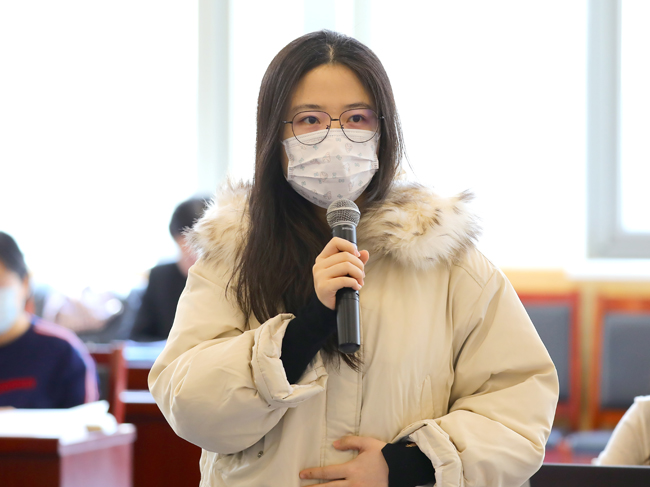
Xinhua News Agency reporter asked questions.
4. Xinhua News Agency reporter: Director Huang just talked about the "Belt and Road" tax collection and management capacity promotion alliance. Excuse me, what is the main work carried out by this alliance and how effective is it?
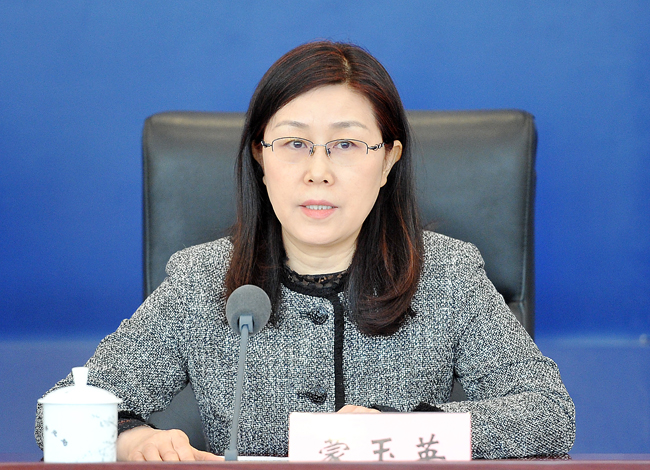
Meng Yuying, Director of State Taxation Administration of The People’s Republic of China International Taxation Department.
Meng Yuying:Thank you for your question. The "Belt and Road" tax collection and management cooperation mechanism (hereinafter referred to as the cooperation mechanism) is the first long-term multilateral tax cooperation mechanism initiated by China. The cooperation mechanism is based on the concerns of the tax authorities of the countries that jointly build the "Belt and Road", and is committed to strengthening the capacity building of tax collection and management and promoting the construction of a growth-friendly tax environment. At present, the number of members of the Council of the cooperation mechanism has increased to 36, and the number of observers has increased to 30. The "circle of friends" and its influence have continued to expand.
The "Belt and Road" Alliance for Promoting Tax Collection and Management Capacity (hereinafter referred to as the Alliance) is an important part of the cooperation mechanism and a multilateral institution responsible for carrying out capacity-building projects such as training, research and technical assistance. The President of the Alliance is responsible for coordinating and organizing the implementation of the Alliance’s work plan and training programs; There is an alliance office, which is responsible for coordinating the development of the "Belt and Road" tax college and other related work of the alliance, and co-located with the secretariat of the cooperation mechanism in Beijing. As a member of the Alliance, China State Taxation Administration of The People’s Republic of China, together with the tax authorities of 19 other members of the Alliance and 14 partners, has made great efforts to enhance tax exchange and cooperation among countries that have jointly built the Belt and Road Initiative, and promote the common improvement of tax collection and management capabilities.
Since the alliance was established more than three years ago, it has mainly done the following work:
The first is to carry out various forms of tax training.Carrying out tax training is the main starting point for the alliance to promote the common improvement of collection and management capabilities. Since the first training session was held in Yangzhou "One Belt, One Road" Taxation College in 2019, the Alliance has held more than 50 training sessions through online and offline training modes, and more than 3,000 tax officials from more than 100 countries (regions) have participated in the training, which has deepened tax cooperation and friendship among countries and won unanimous praise from students from all over the world.
The second is to build a "Belt and Road" tax college.At present, the Alliance has successively established five "Belt and Road" tax colleges in Yangzhou, China, Beijing, China, Macao, China, Astana, Kazakhstan and Riyadh, Saudi Arabia, and established a network of multilingual training institutions radiating English, Chinese, Portuguese, Russian and Arabic. The alliance takes Yangzhou "Belt and Road" Taxation College as the main position, which drives Astana, Macao, China and other colleges to carry out various training activities to meet the development needs of different regions every year, and the role of the alliance training institution network is increasingly apparent.
The third is to form an international team of teachers.Tax experts are widely invited by the Alliance Office to join the first batch of expert teachers in the Alliance. These experts come from government finance and taxation departments, international organizations, academic circles and industries, and their offices are located in 13 countries (regions) on 5 continents. They have profound industry background, good professional quality and rich working experience, which fully embodies the requirements of specialization and internationalization. Experts in the field of taxation in China and officials from taxation departments also actively participated in the lectures.
The fourth is to promote the construction of the alliance curriculum system.Since the training in 2019, relying on the Yangzhou Belt and Road Taxation Institute, the Alliance has successively launched four online courses, namely, tax dispute resolution, digitalization of tax collection and management, tax service and value-added tax reform. On this basis, the Alliance Office has extensively absorbed opinions and suggestions from all parties, actively learned from the experience of other international organizations in carrying out professional training, and designed and completed version 1.0 of the Alliance curriculum system.
According to the development plan of the alliance, the alliance office will invite more international tax experts to join the team of alliance experts, further strengthen cooperation and exchanges based on the characteristics of the "Belt and Road" tax colleges, comprehensively develop knowledge products, share training resources such as teachers and courses, realize the alliance training with wider coverage, larger scale and richer content, promote the joint construction of the "Belt and Road" countries, and further enhance the international influence of the alliance.

China Daily reporter asked questions.
5. China Daily reporter: Director Meng just talked about the 1.0 version of the curriculum system of the "Belt and Road" tax collection and management capacity promotion alliance. Can you introduce this curriculum system in detail?
Meng Yuying:Thank you for your question. The Alliance Office will release version 1.0 of the Alliance Curriculum System in official website today. In order to continue to play the role of the alliance capacity-building platform, realize the common improvement of the tax collection and management capacity of the countries building the Belt and Road, and promote the standardization and systematization of alliance training, the alliance is practical, practical and effective-oriented, adheres to the scientific, systematic and inclusive design concept, closely follows the functional orientation of the tax department and the duties of tax personnel, and constantly summarizes practical experience to design and form the alliance curriculum system version 1.0, aiming at helping students understand tax rules and best through training.
The 1.0 version of the curriculum system includes 4 themes and 65 courses. The four themes are tax system, tax collection and digitalization, tax business environment and tax service, and tax cooperation. According to the principles of from shallow to deep, from easy to difficult, from simple to complex, alliance courses are divided into three levels: primary, intermediate and advanced. 90% of the courses will be launched before August this year, and all courses will be launched during the year.
The design of version 1.0 of the alliance curriculum system mainly has three characteristics:
First, insist on discussing, building and sharing.The Alliance Office fully communicates with the members of the cooperation mechanism, alliance members, partners and academic circles, and brainstorms ideas to jointly build an alliance curriculum system. Invite tax officials from relevant countries (regions), teachers from the "Belt and Road" tax institute and experts from international organizations to participate in the course design and teaching. The remarkable increase in the participation of all parties better reflects the multilateral characteristics of the alliance and will further promote mutual learning and learning.
The second is to adhere to demand orientation.The course not only covers the universally applicable contents such as tax system, tax collection and management, and tax service, but also takes into account the areas such as tax dispute settlement and business environment optimization that tax officials in countries building the "Belt and Road" together, and at the same time, appropriately integrates the frontier research hotspots in the international tax field such as the "two-pillar" scheme. Combined with the feedback from the questionnaire of the students in the pilot courses and the practical experience of training, these course designs can better meet the training needs of tax personnel in countries that jointly build the "Belt and Road".
The third is to adhere to dynamic, inclusive and open.The alliance curriculum system adopts the design idea of dynamic optimization, closely follows the development and changes of international rules, pays attention to the latest trends of international taxation, continuously updates and dynamically adjusts according to the actual needs and feedback from students’ questionnaires, aiming at the innovation of taxation theory and practice. At the same time, we will draw on and absorb opinions from all walks of life, welcome countries to share their best practices on the alliance platform, and continue to invite experts from all walks of life to participate in teaching, open to the world and constantly improve.
State Taxation Administration of The People’s Republic of China, China actively participated in the curriculum design of the Alliance, and introduced and shared the experiences and practices of China tax authorities. In the next step, according to the development plan of the Alliance, the Alliance Office will work with all participants and lecturers to promote courseware production and translation, video recording and online courses in an orderly manner, further optimize and improve the courses according to the actual situation, and make preparations for opening offline courses.
Thank you!
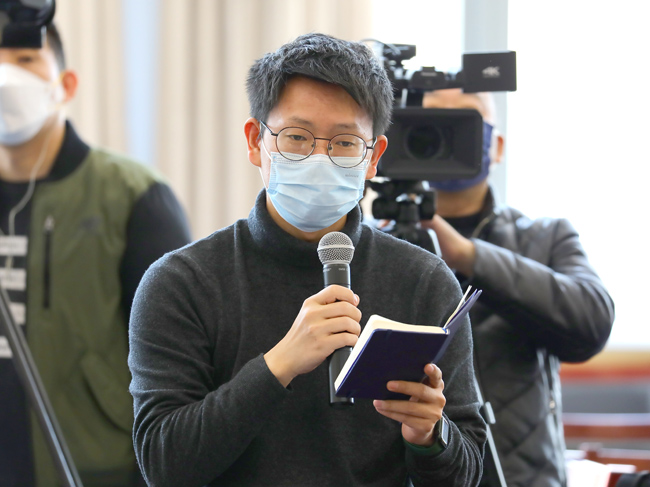
China Youth Daily reporter asked questions.
6. China Youth Daily reporter: We are concerned that in recent years, some criminals have carried out tax-related fraud through the Internet. Excuse me, how can taxpayers prevent this kind of fraud? What has the tax department done to crack down on online tax-related fraud?
Huang Yun:Thank you for your question. As you said, in recent years, some lawless elements have used the Internet and new media to conduct false guidance and even implement online tax-related fraud, extending the "black hand" to taxpayers.
According to the information we have collected, there are at least the following types of online tax-related fraud: some directly swindle taxpayers’ money to gain illegal benefits, some illegally defraud taxpayers’ information, especially personal privacy and business secrets, for "gray transactions", and some deliberately create panic to attract taxpayers to expand their business. From the point of view of means, criminals usually pretend to be tax officials in the form of text messages, telephone calls, internet or even direct visits, and use tax inspection, winning prizes and other excuses to induce taxpayers to transfer payments or provide relevant information; Others use video clips, online training and other means to distort and interpret tax policies and tax management, and deceive taxpayers in the name of helping solve tax-related problems to achieve their illegal profit.
Here, we give the taxpayers some tips to prevent fraud and fraud:The first is to raise awareness of prevention.In case of pretending to be a tax official to collect taxes and fees, promoting various "new policies" for tax refund or receiving unknown links and QR codes forged as tax-related information, we must be highly vigilant, refuse temptation, calmly identify, and never reveal privacy or make transfer payments.The second is to identify official channels.Carry out business handling and tax-related consultation through the official websites of the State Administration of Taxation and local tax authorities, service hotlines, electronic tax bureaus and other channels. Don’t trust unofficial information and channels, and beware of fraud induced by criminals.The third is to report and verify in time.In case of any relevant situation, please consult the 12366 service hotline or the competent tax authorities for further verification, or immediately call 110 and the national anti-fraud hotline 96110 for help.
The State Administration of Taxation attaches great importance to cracking down on online tax-related fraud, continues to carry out anti-fraud propaganda, and actively establishes and improves the linkage mechanism with public security departments to carry out governance. At the same time, the State Internet Information Office and the State Administration of Markets jointly issued the "On Regulating Tax-related Intermediary Services   The Notice on Promoting the Healthy Development of the Tax-related Intermediary Industry severely investigated and dealt with illegal acts such as false propaganda information and malicious tax planning by tax-related intermediaries, and publicly exposed a number of typical cases with bad nature.
In the next step, we will continue to intensify efforts to control tax-related fraud and public exposure, strengthen the crackdown and strengthen the shock, and fully protect the national tax interests and the legitimate rights and interests of taxpayers.
Thank you!
Huang Yun:Because of the time, the question-and-answer session ends here. In the next step, the national tax system will continue to follow the guidance of Socialism with Chinese characteristics Thought of the Supreme Leader in the New Era, thoroughly implement the spirit of the 20th Party Congress, and continue to carry out the "Spring Breeze Action to Facilitate Taxes" in accordance with the decision-making arrangements of the CPC Central Committee and the State Council, constantly optimize the tax business environment, actively promote high-quality development, fully serve the high-level opening up, give full play to and expand the basic, pillar and supportive role of tax revenue in national governance, and promote the overall improvement of economic operation and achieve effective upgrading and upgrading of quality.
Today’s press conference is over. Thank you again for your friends from the media.